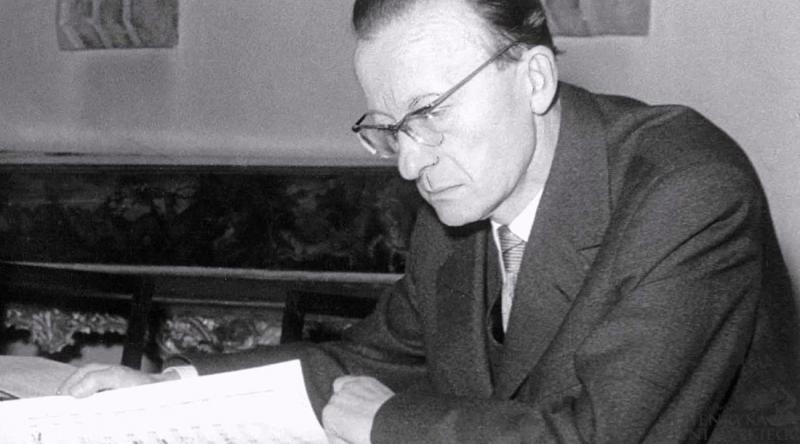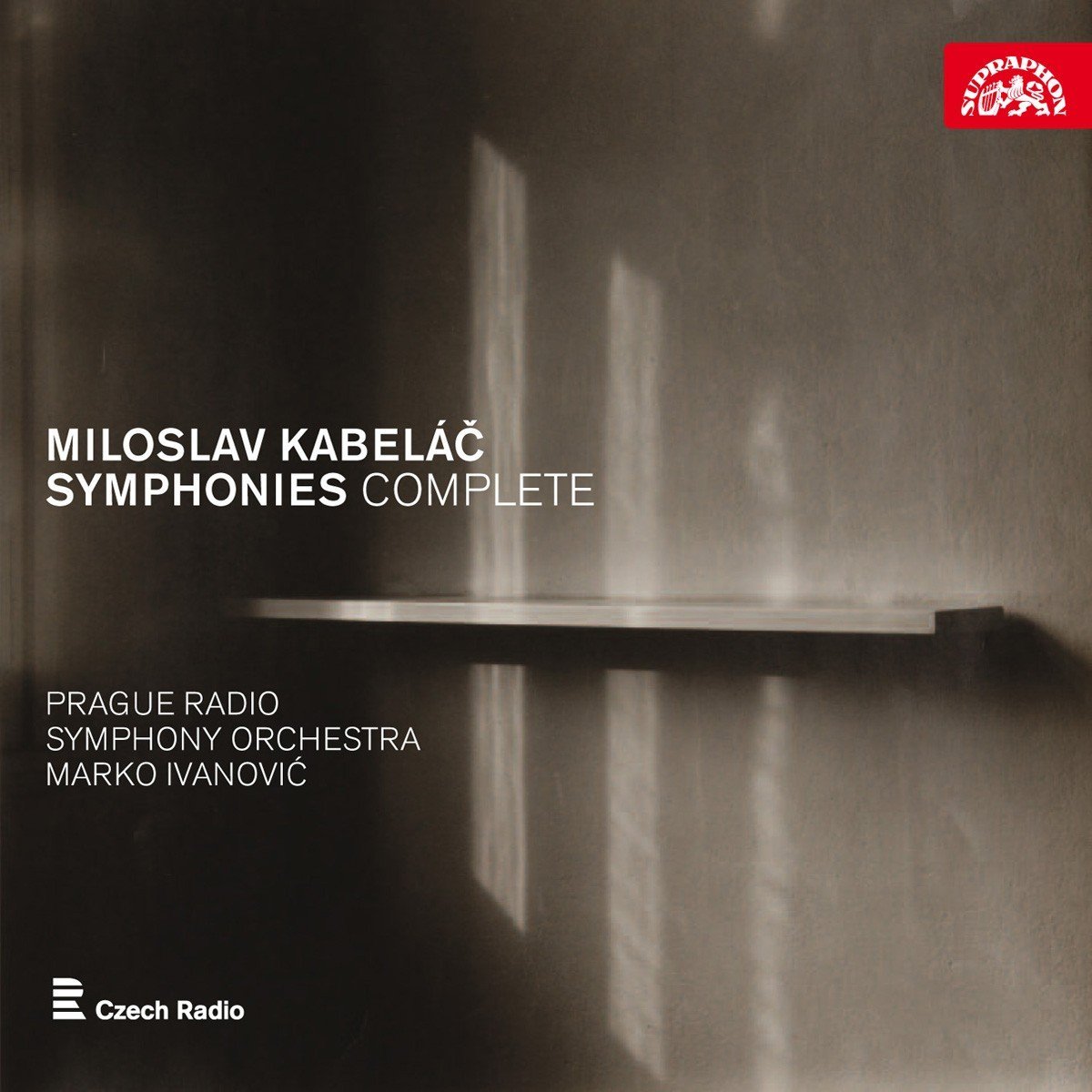Classical CDs Weekly: Kabeláč, Ligeti, Shostakovich | reviews, news & interviews
Classical CDs Weekly: Kabeláč, Ligeti, Shostakovich
Classical CDs Weekly: Kabeláč, Ligeti, Shostakovich
Epic Czech orchestral music, Hungarian wind sounds and Soviet quartets

 Miloslav Kabeláč: Complete Symphonies Prague Radio Symphony Orchestra/Marko Ivanović (Supraphon)
Miloslav Kabeláč: Complete Symphonies Prague Radio Symphony Orchestra/Marko Ivanović (Supraphon)
Finding an imposing cycle of eight symphonies by a 20th century composer you’ve never heard of is an event. There’s precious little of Miloslav Kabeláč’s music presently available on disc, making this release a must-hear. His was a singularly unlucky life: born in 1908, he rose to prominence as a composer in the late 1930s, gaining a senior post at Prague Radio. Having a Jewish wife, Kabeláč resigned from the role soon after the German occupation, his music officially deemed unperformable as a result of his "mixed marriage". Post-war, Kabeláč had no intention of appeasing the Czechoslovakian Communist regime and endured a difficult relationship with the state thereafter, his strong religious faith another sticking point. Predictably, these are not easy symphonies to assimilate, with even the few lighter moments tinged with dour melancholy. What’s fascinating is how mind-blowingly original much of this music is, doubly so when one considers that Kabeláč would have had little or no access to developments in Western Europe. Things become especially outré from 1960’s Symphony No. 5 onwards, written for wordless soprano and large orchestra. This performance has the wonderful Pavla Vykopalová in the solo role, her wilder outbursts anticipating passages in Britten’s War Requiem. No. 6 pits solo clarinet against similarly combative tutti forces, and No. 7 has a prominent part for narrator, loudly declaiming Biblical verses in Czech. It genuinely sounds like nothing else you’ll have heard. Kabeláć’s final Symphony received its first performance in Strasbourg in 1971. Scored for mixed choir, soprano, percussion and organ, this is startling, unsettling music, the clangorous closing pages both ecstatic and terrifying. Poor Kabeláć couldn’t get to the premiere, the authorities having denied him a travel permit.
The earlier symphonies offer an easier entry point. The tunes don’t exactly come thick and fast but the craft is impeccable: Nos. 3 and 4 are both pieces you’ll want to return to, the latter’s transparent orchestration and busy counterpoint as approachable as Kabeláć gets. I can’t recommend this set enough. Don’t expect to find it popping up on Classic FM soon, but put in the hours and you’ll reap the rewards; Kabeláč’s symphonies are certainly less oppressive than, say, Hartmann’s. Fabulously accomplished performances from Marko Ivanović and the Prague Radio Symphony Orchestra, and excellent sound. Stretch your ears. Buy this box set.
 Ligeti: Six Bagatelles, Kammerkonzerte, Dix Pièces pour quintette à vent Les Siècles/François-Xavier Roth (Actes Sud)
Ligeti: Six Bagatelles, Kammerkonzerte, Dix Pièces pour quintette à vent Les Siècles/François-Xavier Roth (Actes Sud)
This superb anthology of György Ligeti’s music isn’t quite what you’re expecting it to be. François-Xavier Roth’s Les Siècles are a celebrated period-instrument outfit, best known for a series of brilliant recorded excursions into the 19th and early 20th century orchestral repertoire. Reading that they’ve tackled Ligeti made me wonder if they’d found a collection of Soviet-bloc wind instruments in need of exhumation. These aren’t "period" performances, but they’re informed by the same acute sense of colour and timbre which always informs their work. Roth describes the 20th century as "belonging" to winds and percussion, and the three Ligeti works chosen neatly sum up three stages in the composer’s career. The early Six Bagatelles have never sounded better on disc; pungent, folk-inspired miniatures which fuse technical brilliance with real wit. Quite how these players manage to articulate the third bagatelle’s overlapping rhythms so cleanly and at such a reckless speed is beyond me.
This is a classic of the wind quintet repertoire, so it’s instructive to compare it with the lesser known Dix Pièces, composed after Ligeti had become an Austrian citizen in 1968. Did any post-war composer write so well for winds? The sounds are bewitchingly strange: the tiny “Presto staccatissimo e leggiero” suggests buzzing insects. The early movements growl and grumble, the pitches gradually shifting upwards until the final one consists mostly of shrill piccolo. Don’t switch off – there’s an unexpected, absurd bassoon fart, a nod to Ligeti’s beloved Lewis Carroll. At the disc’s centre is 1970’s Kammerkonzert, a sustained, highly imaginative exploration of orchestral colour. Listen out for the harpsichord and Hammond organ. Marvel at the slow movement’s otherworldly sound clouds and at the mercurial, crepuscular final section. All superbly played and recorded.
 Shostakovich: String Quartets 1-15 Brodsky Quartet (Chandos)
Shostakovich: String Quartets 1-15 Brodsky Quartet (Chandos)
The Brodsky Quartet’s earlier Shostakovich cycle is still available, but this new set, recorded live in Amsterdam, is a safer bet. The playing is technically more assured and the performances are far more emotionally involving. Having the 15 quartets programmed chronologically over five discs is a real asset, and it’s worth taking the trouble to listen to them in order, the composer’s inner workings forensically exposed. The Brodskys make a brilliant case for the sequence’s shadier corners; the melodramatic, autobiographical Eighth Quartet is a small part of the story. Though that work is terrifying here, viscerally violent and full of impact; you can sense the well-behaved Dutch audience recoiling.
What grabbed me were the lesser-known quartets. Take No. 6, a mostly radiant G major piece which is too easily dismissed. The first movement’s crisis is just fraught enough, making the return to normality all the more moving. And the Fifth is terrific here, a reading full of dogged, incisive rhythms and pained introspection, the rarified final pages quietly beautiful. The sly humour of Nos. 9 and 11 is brilliantly expressed, the former’s astonishing finale intensely moving. The earlier Brodsky cycle now sounds too loud, too aggressive in comparison. Other moments to savour include the powerfully affirmative close of No. 12 (one of the few unambiguously positive endings in Shostakovich’s output) and a poignant account of No. 14. All excellent, in other words: everyone should seek out analogue cycles from the Fitzwilliam and Borodin Quartets (the latter also on Chandos), but this is as good a modern digital set as you’ll find, and the recorded sound is excellent.
Explore topics
Share this article
The future of Arts Journalism
You can stop theartsdesk.com closing!
We urgently need financing to survive. Our fundraising drive has thus far raised £49,000 but we need to reach £100,000 or we will be forced to close. Please contribute here: https://gofund.me/c3f6033d
And if you can forward this information to anyone who might assist, we’d be grateful.

Subscribe to theartsdesk.com
Thank you for continuing to read our work on theartsdesk.com. For unlimited access to every article in its entirety, including our archive of more than 15,000 pieces, we're asking for £5 per month or £40 per year. We feel it's a very good deal, and hope you do too.
To take a subscription now simply click here.
And if you're looking for that extra gift for a friend or family member, why not treat them to a theartsdesk.com gift subscription?
more Classical music
 Bizet in 150th anniversary year: rich and rare French offerings from Palazzetto Bru Zane
Specialists in French romantic music unveil a treasure trove both live and on disc
Bizet in 150th anniversary year: rich and rare French offerings from Palazzetto Bru Zane
Specialists in French romantic music unveil a treasure trove both live and on disc
 Scottish Chamber Orchestra, Ibragimova, Queen’s Hall, Edinburgh review - rarities, novelties and drumrolls
A pity the SCO didn't pick a better showcase for a shining guest artist
Scottish Chamber Orchestra, Ibragimova, Queen’s Hall, Edinburgh review - rarities, novelties and drumrolls
A pity the SCO didn't pick a better showcase for a shining guest artist
 Kilsby, Parkes, Sinfonia of London, Wilson, Barbican review - string things zing and sing in expert hands
British masterpieces for strings plus other-worldly tenor and horn - and a muscular rarity
Kilsby, Parkes, Sinfonia of London, Wilson, Barbican review - string things zing and sing in expert hands
British masterpieces for strings plus other-worldly tenor and horn - and a muscular rarity
 From Historical to Hip-Hop, Classically Black Music Festival, Kings Place review - a cluster of impressive stars for the future
From quasi-Mozartian elegance to the gritty humour of a kitchen inspection
From Historical to Hip-Hop, Classically Black Music Festival, Kings Place review - a cluster of impressive stars for the future
From quasi-Mozartian elegance to the gritty humour of a kitchen inspection
 Shibe, LSO, Adès, Barbican review - gaudy and glorious new music alongside serene Sibelius
Adès’s passion makes persuasive case for the music he loves, both new and old
Shibe, LSO, Adès, Barbican review - gaudy and glorious new music alongside serene Sibelius
Adès’s passion makes persuasive case for the music he loves, both new and old
 Anja Mittermüller, Richard Fu, Wigmore Hall review - a glorious hall debut
The Austrian mezzo shines - at the age of 22
Anja Mittermüller, Richard Fu, Wigmore Hall review - a glorious hall debut
The Austrian mezzo shines - at the age of 22
 First Person: clarinettist Oliver Pashley on the new horizons of The Hermes Experiment's latest album
Compositions by members of this unusual quartet feature for the first time
First Person: clarinettist Oliver Pashley on the new horizons of The Hermes Experiment's latest album
Compositions by members of this unusual quartet feature for the first time
 Gesualdo Passione, Les Arts Florissants, Amala Dior Company, Barbican review - inspired collaboration excavates the music's humanity
At times it was like watching an anarchic religious procession
Gesualdo Passione, Les Arts Florissants, Amala Dior Company, Barbican review - inspired collaboration excavates the music's humanity
At times it was like watching an anarchic religious procession
 Classical CDs: Camels, concrete and cabaret
An influential American composer's 90th birthday box, plus British piano concertos and a father-and-son duo
Classical CDs: Camels, concrete and cabaret
An influential American composer's 90th birthday box, plus British piano concertos and a father-and-son duo
 Cockerham, Manchester Camerata, Sheen, Martin Harris Centre, Manchester review - re-enacting the dawn of modernism
Two UK premieres added to three miniatures from a seminal event of January 1914
Cockerham, Manchester Camerata, Sheen, Martin Harris Centre, Manchester review - re-enacting the dawn of modernism
Two UK premieres added to three miniatures from a seminal event of January 1914
 Kempf, Brno Philharmonic, Davies, Bridgewater Hall, Manchester review - European tradition meets American jazz
Bouncing Czechs enjoy their Gershwin and Brubeck alongside Janáček and Dvořák
Kempf, Brno Philharmonic, Davies, Bridgewater Hall, Manchester review - European tradition meets American jazz
Bouncing Czechs enjoy their Gershwin and Brubeck alongside Janáček and Dvořák
 Solomon, OAE, Butt, QEH review - daft Biblical whitewashing with great choruses
Even a top soprano and mezzo can’t make this Handel paean wholly convincing
Solomon, OAE, Butt, QEH review - daft Biblical whitewashing with great choruses
Even a top soprano and mezzo can’t make this Handel paean wholly convincing

Add comment